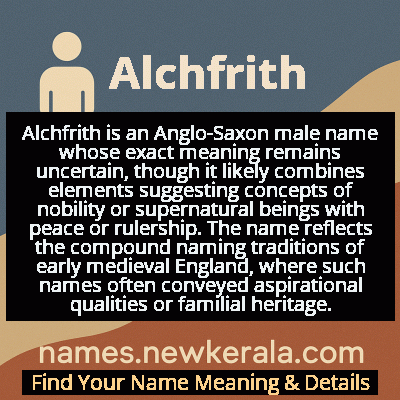Alchfrith Name Meaning & Details
Origin, Popularity, Numerology Analysis & Name Meaning of Alchfrith
Discover the origin, meaning, and cultural significance of the name ALCHFRITH. Delve into its historical roots and explore the lasting impact it has had on communities and traditions.
Name
Alchfrith
Gender
Male
Origin
Anglo
Lucky Number
4
Meaning of the Name - Alchfrith
Alchfrith is an Anglo-Saxon male name whose exact meaning remains uncertain, though it likely combines elements suggesting concepts of nobility or supernatural beings with peace or rulership. The name reflects the compound naming traditions of early medieval England, where such names often conveyed aspirational qualities or familial heritage.
Alchfrith - Complete Numerology Analysis
Your Numerology Number
Based on Pythagorean Numerology System
Ruling Planet
Uranus (Rahu)
Positive Nature
Strong sense of order, loyal, practical, and disciplined.
Negative Traits
Stubborn, overly serious, rigid, and prone to feeling restricted.
Lucky Colours
Blue, gray.
Lucky Days
Saturday.
Lucky Stones
Blue sapphire.
Harmony Numbers
1, 7, 8.
Best Suited Professions
Managers, engineers, accountants, organizers.
What People Like About You
Dependability, discipline, practicality.
Famous People Named Alchfrith
Alchfrith of Deira
Anglo-Saxon Prince and Sub-king
Son of King Oswiu of Northumbria who ruled Deira as sub-king and played a significant role in the Synod of Whitby in 664 CE
Alchfrith of Lindsey
Anglo-Saxon Noble
Mentioned in historical records as a nobleman in the kingdom of Lindsey, contributing to early English Christianization
Alchfrith the Thegn
Anglo-Saxon Landowner
Recorded in the Domesday Book as a significant landowner in pre-Conquest England, preserving Anglo-Saxon administrative traditions
Name Variations & International Equivalents
Click on blue names to explore their detailed meanings. Gray names with will be available soon.
Cultural & Historical Significance
The name's appearance in various historical records, including charters and the Domesday Book, demonstrates its persistence among the Anglo-Saxon nobility and landowning class. As a linguistic artifact, Alchfrith provides insight into naming conventions of the period, where compound names combining elements like 'Aelf' (elf) or 'Aethel' (noble) with elements like 'frith' (peace) were common. The name's gradual disappearance after the Norman Conquest reflects the broader cultural shifts that occurred as Anglo-Saxon traditions were supplanted by Norman French influences, making surviving examples valuable for understanding pre-Conquest English society.
Extended Personality Analysis
Individuals named Alchfrith are typically associated with a personality that combines traditional wisdom with adaptive intelligence. They often exhibit natural leadership qualities, demonstrating both the authority expected of historical nobility and the diplomatic skills necessary for navigating complex social situations. This combination makes them particularly effective in roles requiring mediation between established traditions and new approaches, much like their historical namesakes who operated during periods of significant cultural transition. Their decision-making tends to be deliberate and well-considered, reflecting a deep respect for history and precedent while remaining open to innovation when circumstances demand.
In interpersonal relationships, those named Alchfrith often display strong loyalty and protective instincts toward their community and principles. They typically possess a quiet confidence that inspires trust in others, coupled with a strategic mindset that allows them to see the broader implications of their actions. While they may appear reserved initially, they usually develop deep, meaningful connections with those who share their values and intellectual curiosity. Their personality often includes a strong sense of responsibility toward preserving important traditions while recognizing the necessity of evolution, creating a balanced approach to both personal growth and community leadership that respects the past while engaging constructively with the present.
Modern Usage & Popularity
In contemporary naming practices, Alchfrith exists almost exclusively as a historical reference rather than a living given name. Its modern usage is primarily confined to academic contexts, historical fiction, and families with particularly strong interests in Anglo-Saxon heritage. The name has not registered in official birth records in any English-speaking country for over a century, reflecting its status as an archaeological artifact of naming traditions. However, there has been minimal interest in recent years among parents seeking extremely distinctive names with authentic historical roots, particularly within communities focused on early medieval reenactment or Anglo-Saxon cultural revival. The name's complexity and unfamiliar pronunciation to modern ears present significant barriers to widespread adoption, ensuring it remains a rare choice reserved for those with specific historical or cultural motivations rather than general naming trends.
Symbolic & Spiritual Meanings
Symbolically, Alchfrith represents the enduring connection between contemporary identity and historical roots, serving as a bridge across centuries of cultural evolution. The name embodies the concept of 'noble peace' or 'elf-counsel,' suggesting a personality that combines otherworldly wisdom with diplomatic skill and aristocratic responsibility. Metaphorically, it speaks to the importance of maintaining cultural continuity while adapting to changing circumstances, much like the Anglo-Saxon kingdoms that preserved certain traditions while embracing Christianity and new political structures. The name also symbolizes the quiet persistence of cultural memory, representing how elements of ancient identity can survive despite dramatic historical transformations and centuries of linguistic change, reminding us that the past continues to inform our present in subtle but significant ways.

